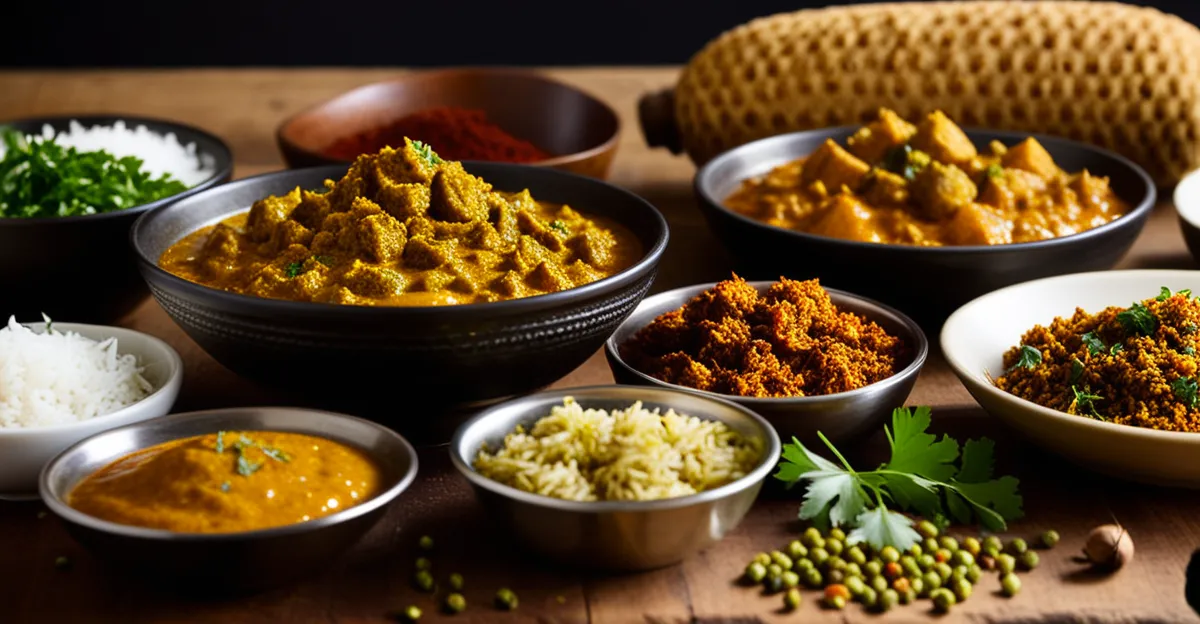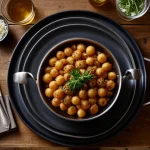Core Spices in Traditional British Curries
Understanding the British curry essential spices helps decode the classic taste that defines these beloved dishes. The foundational curry spice ingredients usually include turmeric, cumin, coriander, chili powder, and garam masala—each vital for layering British curry flavors.
Turmeric brings a warm golden hue and subtle earthiness, enriching both color and antioxidant content. Cumin offers a nutty, slightly smoky depth that grounds the curry’s backbone. Meanwhile, coriander seeds contribute a fresh, lemony aroma, balancing the spices with brightness. The moderate heat from chili powder adds mild warmth without overpowering the dish, making the flavors accessible to a broad audience. Completing the blend, garam masala—a mix of ground spices like cinnamon, cloves, and cardamom—infuses warmth and complexity, creating the signature aroma associated with British curries.
In the same genre : How Does Traditional British Cuisine Influence Modern UK Cooking Trends?
Together, these British curry essential spices establish the traditional flavor profile renowned in home cooking and eateries alike. Their thoughtful balance brings harmony, where earthiness meets gentle heat and aromatic freshness, defining the comforting, rich palate that makes British curry so distinct. Each spice’s specific role is crucial for the depth and satisfaction characteristic of these timeless dishes.
Core Spices in Traditional British Curries
Understanding the British curry essential spices is key to unlocking authentic flavors. The foundation typically includes turmeric, cumin, coriander, chili powder, and garam masala. Each spice plays a vital role in crafting the classic taste that defines British curry flavors.
In the same genre : What Are the Essential Ingredients for Authentic British Recipes?
Turmeric lends a warm, earthy base and its vibrant yellow hue marks many British curry dishes. It mildly flavors while offering health benefits, making it indispensable.
Cumin adds depth with its nutty, slightly peppery aroma, enriching the curry’s complexity. Its presence enhances the balance between spices.
Coriander seeds contribute subtle citrus notes and a light sweetness, lifting the curry’s character beyond simple heat.
Chili powder introduces heat, although British curries often keep it moderate to appeal to a broader palate, reflecting their unique spice moderation.
Lastly, garam masala, a blend of spices often added towards the end of cooking, infuses warmth and aromatic richness, rounding out the flavor profile beautifully.
Together, these curry spice ingredients create the traditional flavor profiles known in British curries: a harmonious blend of warmth, mild heat, and a balanced earthiness that invites both comfort and enjoyment.
Spice Blends and Typical Variations
British curry spice blends often feature curry powder and garam masala in British curry preparations. Curry powder is a pre-mixed combination of curry spice ingredients such as turmeric, cumin, coriander, chili powder, and fenugreek, providing a consistent base flavor. Garam masala in British curry differs subtly from Indian versions, usually milder and tailored for British curry flavors with a pronounced warmth but less intense heat.
The key difference between British and Indian curry blends lies in spice ratios and heat level. British curry spice blends use a gentler chili presence, balancing richness over spiciness, whereas Indian blends tend to be bolder and more complex.
Home cooks often adapt these blends by mixing store-bought curry powders with fresh garam masala in British curry recipes for added aroma. Popular homemade blends emphasize:
- A balanced proportion of turmeric for color
- Moderate cumin and coriander for earthy tones
- Controlled use of chili powder for approachable warmth
These variations maintain signature British curry flavors while allowing flexibility in heat and aroma, making traditional dishes more accessible and customizable. Approaching spice blends this way ensures authentic taste with room for personal preference.
Spice Blends and Typical Variations
British curry spice blends often center around garam masala in British curry and curry powder variations, which contribute distinct characteristics to traditional dishes. Garam masala in British curry typically combines cinnamon, cloves, cardamom, and black pepper, delivered as a warming, aromatic finish. It is usually added late in cooking to preserve its fragrant qualities, boosting the depth of British curry flavors without overwhelming heat.
Curry powder variations, a uniquely British invention, differ significantly from Indian spice blends. British curry spice blends tend to moderate chili heat and emphasize earthiness and warmth, balancing spices like turmeric, cumin, and coriander with subtle sweetness. Unlike many Indian blends that might spotlight intense chili or individual regional spices, British blends focus on accessibility and comfort, reflecting local tastes.
Home cooks often adapt these traditional British curry spice blends to suit their preferences. Popular modifications include adjusting chili powder levels for heat or adding fenugreek for a slightly bitter nuance. British curry spice blends also vary by brand and recipe, leading to personalized taste profiles. This adaptability makes British curries both traditional and flexible, encouraging experimentation within the familiar boundaries of curry spice ingredients.
Sourcing and Practical Substitutions
Finding authentic British curry essential spices can sometimes be challenging, especially outside major urban centres. For convenient curry spices sourcing, specialty Asian or Indian grocery stores often carry high-quality turmeric, cumin, coriander, chili powder, and garam masala. Supermarkets with international aisles also stock common curry spice ingredients and ready-made blends, providing a reliable option for home cooks.
If you face difficulties with availability, practical curry spice substitutes can help maintain traditional British curry flavors. For example, mustard powder can partially replace turmeric’s earthiness, while ground nutmeg or allspice may stand in for some garam masala warmth if needed. Paprika offers a milder alternative to chili powder for gentle heat.
Choosing between individual spices and pre-mixed curry powders depends on your cooking style. Ready blends provide ease and consistency, ideal for beginners or quick meal prep. In contrast, precise control over flavor balance is possible when using single curry spices individually. Understanding each spice’s role, you can customize blends to suit personal taste while preserving the distinctive profile of British curry spice blends.
Overall, knowing where to buy curry spices and how to substitute thoughtfully ensures making delicious British curries remains accessible and rewarding.
Sourcing and Practical Substitutions
Locating high-quality British curry essential spices is key to replicating authentic British curry flavors at home. Specialty spice shops, Asian grocery stores, and reputable online retailers are excellent sources for fresh curry spice ingredients such as turmeric, cumin, coriander, and chili powder. Buying whole spices and grinding them fresh can greatly elevate the depth of flavor.
When certain spices are unavailable, practical curry spice substitutes can bridge the gap. For example, ground paprika or smoked paprika can soften the absence of chili powder while maintaining warm colour and mild heat. Ground caraway seeds offer a close alternative to cumin, while ground fennel seeds may replace coriander with a subtly sweet undertone. These substitutions help maintain balance and preserve traditional profiles.
Using pre-mixed curry powders versus individual spices is a common consideration. Pre-mixed blends offer convenience and consistent taste but may lack the customizable nuance of individual ingredients. For greater control over spiciness and aroma, cooking with British curry spices individually allows a tailored approach based on preferences and specific recipes.
Ultimately, understanding where to buy curry spices and how to select proper substitutes empowers cooks to confidently create classic British curries, even when ideal ingredients are out of reach.
Using Spices in British Curry Cooking
Mastering cooking with British curry spices requires understanding when and how to add each spice to maximize flavor. Typically, spices like turmeric, cumin, and coriander are added early and cooked in oil—a process called “blooming.” This step releases and intensifies the spices’ aromas and flavors, creating a rich base that defines British curry flavors. Blooming ensures spices dissolve evenly, preventing bitterness.
Garam masala in British curry is usually added towards the end of cooking to preserve its delicate warmth and aromatic complexity. Adding it too early can cause volatile oils to dissipate, reducing its impact.
For heat adjustment, chili powder can be introduced gradually. Starting with a small amount and tasting as the curry cooks allows cooks to balance warmth without overpowering the dish. This method respects British preferences for moderate heat.
When fine-tuning spice depth, layering flavors through multiple additions of spices, such as adding some cumin at the start and a pinch during finishing, enriches the curry’s profile. Experimenting with timing and quantity is key to achieving a nuanced outcome that highlights each curry spice ingredient.
In sum, careful sequencing and attentive use of British curry essential spices empower cooks to craft balanced, aromatic, and deeply satisfying British curries.
Using Spices in British Curry Cooking
Mastering cooking with British curry spices hinges on knowing how and when to add each spice for optimal flavor. Blooming spices in hot oil early in the cooking process is essential to unlock their full aroma and deepen the dish’s flavor. This technique activates the volatile oils in spices like cumin and coriander, enhancing their complexity.
The typical order of adding curry spices matters significantly. Begin with whole or ground turmeric, cumin, and coriander to build a warm, earthy base. Chili powder can be introduced gradually to control heat level, ensuring the dish stays approachable. Adding garam masala in British curry near the end preserves its aromatic warmth without overwhelming other flavors.
Balancing spices involves tasting often and adjusting quantities, especially for chili powder, since British curries typically prioritize mild heat. For cooks aiming to tailor intensity, adding chili gradually or finishing with a pinch of garam masala provides versatility.
Additional curry spice tips include layering spices at multiple stages and pairing spices with dairy or tomatoes to mellow bitterness and brighten flavors. Understanding these nuances makes cooking with British curry spices both accessible and rewarding, allowing home cooks to recreate authentic British curry flavors with confidence and ease.





